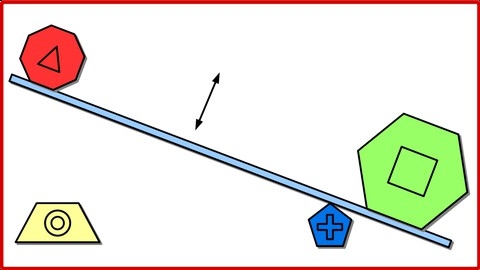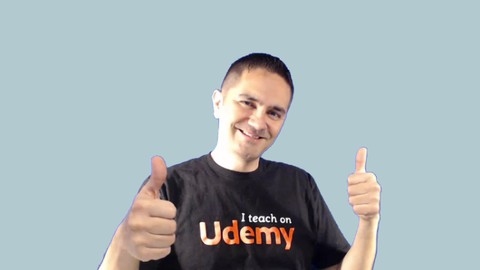The Project Management Professional (PMP)® certification is a globally recognized credential that validates your expertise in project management.
Earning this certification demonstrates your ability to effectively manage projects, lead teams, and achieve organizational goals.
A PMP® certification can open doors to leadership roles, increased earning potential, and career advancement opportunities.
Finding the right PMP® course on Udemy can be a challenge, with so many options available.
You want a program that’s comprehensive, engaging, and taught by experienced professionals who can prepare you for the demanding PMP® exam.
For the best PMP® course overall on Udemy, we recommend PMP Certification Exam Prep 35 PDU Project Management Course.
This comprehensive course provides in-depth coverage of all 10 PMP® knowledge areas and the 49 processes, using real-world examples and practice questions to reinforce learning.
It also emphasizes key exam concepts like Earned Value Management (EVM), Agile methodologies, and procurement, making it a great choice for those looking to pass the exam on the first try.
While this is our top pick, there are many other quality PMP® courses available on Udemy.
Keep reading to explore our recommendations for different learning styles and goals, from beginner-friendly introductions to advanced courses focused on specific aspects of project management.
PMP Exam Prep Seminar - Complete Exam Coverage with 35 PDUs
With 35 professional development units (PDUs) included, this course equips you with the knowledge and skills required to become a certified PMP.
The course begins by laying the foundation for the PMP exam, covering the requirements, qualifications, and the application process.
It then dives into the fundamentals of project management, explaining key concepts such as project life cycles, project management processes, and the project environment.
One of the course’s strengths is its in-depth exploration of the Project Management Body of Knowledge (PMBOK® Guide), which serves as the basis for the PMP exam.
The syllabus dedicates separate sections to each of the ten knowledge areas, including project integration, scope, schedule, cost, quality, resource, communications, risk, procurement, and stakeholder management.
These sections provide a thorough understanding of the processes, tools, and techniques involved in each area, ensuring you are well-prepared for the exam.
In addition to the theoretical knowledge, the course also offers practical advice and strategies for effective project management.
It covers topics such as leadership skills, team management, stakeholder engagement, and risk analysis, providing you with the necessary tools to navigate real-world project challenges successfully.
The course incorporates various learning resources, including flashcards, memory sheets, workbooks, games, and worksheets, catering to different learning styles and reinforcing the concepts covered.
Regular quizzes and assessments are also included, allowing you to gauge your understanding and identify areas that require further attention.
One notable aspect of the syllabus is its emphasis on Agile methodologies, which have gained significant popularity in project management.
The course dedicates several sections to Agile principles, Scrum frameworks, user story estimation, and Agile project performance, ensuring you are well-versed in these modern approaches.
Throughout the course, the instructor, Joseph Phillips, an experienced project management author and expert, provides coaching and guidance, sharing valuable insights and tips to help you prepare for and pass the PMP exam.
PMP Certification Exam Prep Course 35 PDU Contact Hours/PDU
The course starts with an introduction to the instructor and exam details like the PMP process, requirements, format, and question types.
It gives you a good overview of what to expect on the actual PMP exam.
Next, it dives into the fundamentals of project management - key terms, principles, performance domains, and the traditional/predictive approach.
You’ll learn about the 49 processes across the 5 process groups in great detail, including scope, schedule, cost, quality, resource, communication, risk, procurement, and stakeholder management.
Concepts like the project management plan, critical path method, earned value management, and various formulas are covered thoroughly with examples.
The course then shifts gears to agile project management methods like Scrum, XP, Lean, and Kanban.
You’ll understand the agile mindset, manifesto values, prioritization techniques like Planning Poker, and tools like cumulative flow diagrams.
Stakeholder engagement, emotional intelligence, and team dynamics are also discussed for agile environments.
Adaptive agile planning concepts like user stories, story points using the Fibonacci sequence, timeboxing, and continuous improvement practices like retrospectives are explained.
The course even touches on hybrid approaches that combine predictive and agile methods.
Importantly, it goes over professional ethics, the PMP application process, and a detailed review of the exam content outline from PMI.
There are plenty of quizzes and a 180-question mock exam to test your understanding.
The syllabus covers supplementary resources like downloadable PDFs, YouTube videos, and bonus lectures.
You’ll get advice on studying strategies, time management during the exam, and maintaining your PMP certification.
Project Management Fundamentals
You’ll kick things off with an introduction that lays the groundwork for the 12-step process you’ll follow throughout the course.
Once you grasp the big picture, you’ll dive into defining your project - a crucial first step that sets the stage for everything else.
From there, it’s all about breaking down your project into manageable tasks using a Work Breakdown Structure.
This hands-on approach with post-it notes and arrows will help you visualize the flow and dependencies between tasks.
Estimating task durations can be tricky, but the course has you covered with practical tips on how to approach this challenge.
You’ll learn about the critical path - the sequence of tasks that can’t be delayed without impacting the entire project timeline.
To ensure your project stays on track, you’ll explore techniques like adding a safety margin and conducting regular progress checks using a Gantt chart.
This visual representation will become your best friend for monitoring tasks, resources, costs, and that all-important critical path.
Risk analysis is another key component, helping you identify potential roadblocks and plan accordingly.
And when the inevitable hiccups occur, you’ll know how to adjust your plan and keep things moving forward.
Throughout the course, you’ll gain hands-on experience with tools like Excel for creating Gantt charts, budgeting, and resource planning.
And let’s not forget the “Now Line” - a simple yet powerful concept for tracking your progress in real-time.
By the end, you’ll have a solid grasp of the entire project management lifecycle, from initial planning to post-project reviews.
And who knows, you might even develop a love for Gantt charts along the way!
Project Management Essentials
You’ll start by getting an overview of what project management is all about - its fundamentals, who can use it, and how to apply it even to small projects.
The course covers the overall process framework and introduces you to the critical “triple constraint” concept that lies at the heart of project management.
The course then dives into the five stages of the project management life cycle.
In the Initiation stage, you’ll learn the importance of clearly documenting the project objective as the very first step.
This includes defining the scope, assumptions, constraints, and proposed solution.
Next is the Planning stage, which is arguably the most crucial phase.
You’ll learn how to create a detailed plan by breaking down the work into deliverables (Work Breakdown Structure), mapping dependencies (Precedence Diagram), creating schedules (Gantt charts), estimating costs, and managing risks.
By the end, you’ll have a comprehensive project plan ready.
The Execution stage covers best practices for building an effective and diverse project team.
Then comes Monitoring & Control, where you’ll learn techniques to manage scope, schedule, cost, and risks through processes like change control boards and monthly status reviews.
Finally, the Closing stage guides you on wrapping up the project, creating the final report, and following up on recommendations.
Throughout the course, you’ll find exercises to apply the concepts to your own project, really driving home the learnings.
The practice test at the end helps reinforce the key takeaways.
Deeply Practical Project Management (16 PDUs)
The syllabus covers the entire project life cycle, from initiation to closing, ensuring you gain a thorough understanding of the project management process.
The course begins with an overview of project management fundamentals, including the PMI framework, the triple constraint, and the key drivers of project success.
You’ll learn about the critical role of the project manager and the essential skills required, such as communication, team formation, and leadership.
In the initiation phase, you’ll dive into developing a solid project foundation by defining the objective, scope, business case, and project charter.
The course emphasizes the importance of stakeholder analysis and management, ensuring you can effectively engage and manage project stakeholders.
The planning phase is extensive, covering requirements gathering, solution definition, work breakdown structure (WBS), precedence diagramming, estimating techniques (including PERT and Delphi), scheduling (Gantt charts and critical path analysis), resource planning, cost estimation, procurement planning, and risk management.
You’ll learn how to create a comprehensive project plan that balances scope, schedule, and budget.
During the execution phase, the course focuses on building and managing the project team, effective communication modes, problem identification using tools like the Ishikawa (fishbone) diagram, and iterative design and user reviews to ensure the project delivers what the customer needs.
The monitoring and control phase covers essential topics such as the weekly and monthly project status meetings, scope change management, schedule and cost control, risk management, earned value management (EVM) for accurate projections, quality management through peer and user reviews, and problem resolution techniques.
Finally, the closing phase guides you through procurement closure, scope verification (including scenario-based verification), lessons learned documentation, team transition, project celebration, and the final report.
Throughout the course, you’ll have opportunities to practice your skills by working on exercises and baselining your project documentation, such as the WBS, precedence diagram, risk register, and project plan.
The syllabus includes quizzes to reinforce your learning and downloadable resources like templates, examples, and summary checklists.
PMP Certification Exam Prep 35 PDU Project Management Course
The course provides comprehensive coverage of all the knowledge areas and processes involved in project management to prepare you for the PMP certification exam.
It starts with an introduction to fundamental project management concepts like what a project is, its life cycle, process groups, and knowledge areas.
The course then dives deep into each of the 10 knowledge areas - Integration, Scope, Schedule, Cost, Quality, Resource, Communications, Risk, Procurement, and Stakeholder Management.
For each area, it methodically explains the processes, inputs, tools/techniques, and outputs involved.
The course uses practical examples, sample questions, and assignments to reinforce the concepts.
Some key strengths of the course:
- Extensive coverage of Earned Value Management (EVM) concepts like CV, SV, CPI, SPI with detailed examples and practice questions.
This is crucial for the exam.
-
Dedicated sections on important tools like the Work Breakdown Structure (WBS), Network Diagrams, Control Charts, and Risk Analysis techniques.
-
Focus on key formulas, calculations, and interpretation for Schedule, Cost, and Risk Management areas.
-
Detailed overview of procurement concepts like contract types, source selection, and handling changes/claims.
-
Comprehensive lessons on team management, conflict resolution, motivation theories, and leadership styles.
-
Separate modules covering the latest Agile/Hybrid project management methodologies and principles.
The course also covers peripheral topics like communication management, stakeholder analysis, governance, compliance, and organizational change - all relevant for the PMP exam.
The review sessions at the end provide a concise recap.
Project Management for Non Project Managers - PMP/PMI
You’ll start with an overview of what to expect from the course.
Then, the “Project Management Guide” chapter dives into the fundamentals, explaining what a project is, why they can be challenging, and different methodologies like Prince, Agile, and the APM method.
The instructor shares their thoughts on these approaches and walks you through a 12-step process.
One standout section is the “Top Ten Mistakes” chapter.
It provides invaluable tips to avoid common pitfalls, like having only a mental plan, saying “maybe” or “I’ll try” instead of committing, not involving teams enough, and rescheduling too late.
Practical demos, like creating a Gantt chart in Excel, reinforce the lessons.
Bonus lectures explore why these mistakes happen and how to get your certificate upon completion.
There’s even a fun surprise thrown in.
Throughout, you’ll encounter key project management concepts like the Gantt chart, PMP certification, and more.
The quizzes help reinforce your understanding.
PMP Certification: 35+ PDU Formal PMP Exam Prep_New PMP 2024
The instructor takes a structured approach, starting with the basics of project management like explaining key terms, project life cycles, organizational structures etc.
This lays a solid foundation before diving deeper into each knowledge area.
For every knowledge area like Scope, Schedule, Cost, Quality, Resource, Communications, Risk, Procurement and Stakeholder Management, the instructor meticulously goes through all the processes involved.
You learn not just the textbook processes, but also crucial practical aspects like estimating techniques, earned value management, procurement contracts, risk analysis methods and much more.
The examples and tips provided make these concepts crystal clear.
A major strength of this course is its extensive coverage of Agile practices like Scrum, Kanban, lean principles etc.
With almost 50% of the new PMP exam focused on Agile/Hybrid approaches, you get in-depth training on when and how to blend Agile methods with predictive approaches.
From understanding the Agile mindset to implementing Agile ceremonies and artifacts, it prepares you thoroughly.
The instructor also emphasizes key exam concepts repeatedly through “Don’t Forget” sessions, mini-quizzes and realistic practice exams.
This reinforcement really helps cement your understanding of crucial exam topics like project selection methods, procurement contracts, earned value calculations, conflict management and more.
What’s impressive is how the course makes complex formulae and processes like earned value, critical path, expected monetary value analysis etc. so simple to understand through patient explanations and examples.
Even areas like ethics, compliance and organizational theories are covered to ensure you are fully prepared.
The course is extremely comprehensive, yet the instructor’s direct and conversational style makes it easy to follow along.
You get downloadable handouts, over 20 hours of video lessons, 19 full practice exams and additional resources - providing excellent value.
PMP Exam Cram Session - Updated for the current PMP Exam
The course begins by laying a solid foundation, discussing the PMP exam format, qualification requirements, and effective study strategies.
You’ll receive valuable tips on how to approach the exam objectives and implement proven techniques to increase your chances of passing.
Next, the course dives deep into the Project Management Body of Knowledge (PMBOK) Guide, sixth edition, which serves as the primary reference for the PMP exam.
You’ll explore the 13 chapters, including project integration, scope, schedule, cost, quality, resource, communications, risk, procurement, and stakeholder management.
Each knowledge area is thoroughly explained, ensuring you understand the key concepts, processes, and best practices.
One of the course’s strengths is its comprehensive coverage of project management terminology.
You’ll learn about essential terms, business documents, and concepts like the benefits management plan, governance, organization structures, project management offices, and the role of the project manager.
Understanding this terminology will help you navigate the exam questions with ease.
The course also delves into crucial topics like project integration management, which ties together all aspects of a project.
You’ll learn about developing the project charter, selecting projects for initiation, managing assumptions and constraints, and creating a typical project management plan.
The section on scope management is particularly valuable, covering scope planning, creating the work breakdown structure (WBS), and controlling project scope.
Other key areas covered include schedule management (with techniques like estimating, finding float, and schedule compression), cost management (including earned value management), quality management (with an emphasis on quality tools and charts), and resource management (encompassing human resources, team development, and conflict resolution).
Additionally, the course provides insights into project communications, risk management (identifying risks, qualitative and quantitative analysis, and risk response strategies), procurement management (contract types, build vs. buy decisions, and the procurement workflow), and stakeholder management (identifying stakeholders, stakeholder analysis, and the stakeholder register).
The course concludes with a discussion on ethics, the PMI Code of Ethics and Professional Conduct, and an overview of the inputs, tools and techniques, and outputs (ITTOs) for the 49 project management processes.
It also includes a comprehensive practice test to assess your readiness for the PMP exam.
Furthermore, the course covers core agile concepts, planning adaptive projects, agile modeling techniques (like use case diagrams and data models), and leading agile teams, ensuring you’re well-prepared for the agile aspects of the PMP exam.
PMP: The Complete PMP Course & Practice Exams
The course begins with an introduction to project management frameworks, covering key concepts like projects vs. operations, programs, portfolios, project life cycles, and organizational structures like PMOs (Project Management Offices).
You’ll learn about the project management processes, knowledge areas, and roles from experienced instructors like Ku’uipo Murray and Christine Rose.
Moving on, the course dives deep into the five process groups of project management - Initiating, Planning, Executing, Monitoring & Controlling, and Closing.
Each process group is covered in detail, with lectures, templates, and practice questions to reinforce your understanding.
For instance, in the Planning section, you’ll learn about scope management, creating a Work Breakdown Structure (WBS), risk management techniques like qualitative and quantitative analysis, schedule management with tools like bar milestone charts, and cost management.
The Executing section teaches you how to manage project work, knowledge, quality, resources, teams, communications, risk responses, procurement, and stakeholder engagement.
The Monitoring & Controlling module covers crucial topics like earned value management, earned schedule, controlling scope, schedule, costs, quality, resources, risks, and procurements.
The course also introduces you to the world of Agile project management, covering frameworks like Scrum, Kanban, and Lean Startup.
You’ll learn about life cycle selection, creating an Agile environment with concepts like servant leadership and cross-functional teams, delivering in Agile with backlogs and daily standups, and organizational considerations like change management and organizational culture.
To solidify your learning, the course includes a gameboard simulation, PMP exam preparation with review sessions, and a full 200-question practice exam.
Additionally, you’ll receive 35 contact hours/PDUs upon completing the course, which is a requirement for the PMP certification.










